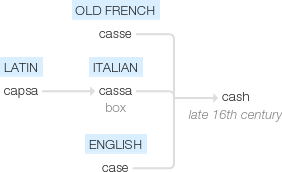Cash
late 16th century (denoting a box for money): from Old French casse or Italian cassa ‘box’, from Latin capsa (see case2).
wiktionary
From Anglo-Norman Old French casse(“money box”), from Latin capsa(“box, case”), ultimately from capiō(“I take, I seize, I receive”), from Proto-Indo-European *keh₂p-(“to grasp”). Doublet of case. Compare Spanish caja(“box”).
From Tamil காசு(kācu). [1]
See cashier.
etymonline
cash (n.)
1590s, "money box;" also "money in hand, coin," from French caisse "money box" (16c.), from Provençal caissa or Italian cassa, from Latin capsa "box" (see case (n.2)); originally the money box, but by 18c. the secondary sense of the money in it became sole meaning.
Like many financial terms in English (bankrupt, etc.), it has an Italian heritage. Not related to (but influencing the form of) the colonial British cash "Indian monetary system, Chinese coin, etc.," which is from Tamil kasu, Sanskrit karsha, Sinhalese kasi.
Cash-crop "agricultural product grown to sell for profit" is attested from 1831; cash-flow from 1954; the mechanical cash-register "machine for automatically recording the sums of money deposited in it" is from 1875.
cash (v.)
"convert (a check, etc.) to cash," 1811, from cash (n.). Encash (1865) also was sometimes used. Related: Cashed; cashing.
